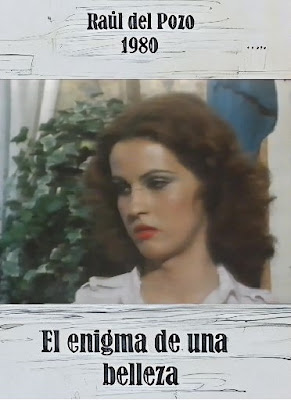Director: Raúl del Pozo
Release Year: 1980
Release Year: 1980
"El Enigma de Una Belleza" is a 1980 documentary that centers on the life of Carla Delgado Gómez, better known by her stage name Carla Antonelli. Born on July 13, 1959, in Güímar, Santa Cruz de Tenerife, Carla Antonelli is a Spanish actress, politician, and LGBT activist who has left an indelible mark on both the entertainment industry and the political landscape, particularly for her contributions to the LGBT rights movement. Directed by Raúl del Pozo, this groundbreaking documentary provides a poignant and intimate glimpse into Antonelli's life, highlighting not only her personal and professional journey but also the broader issues faced by the transgender community in Spain during the late 20th century.
Before Carla Antonelli became the influential activist she is known as today, she had already carved out a space for herself in the notoriously difficult world of entertainment. Raised in an era marked by both social and political turmoil, she used every opportunity to champion her personal causes, drawing attention to issues that were often ignored or swept under the rug. In the late 1970s, while Spain was undergoing significant political transformation following the death of dictator Francisco Franco, Antonelli began her artistic training in Dramatic Arts. However, her journey in the entertainment world would take her beyond the confines of the Canary Islands. In the late 1970s, Carla moved to mainland Spain, where she embarked on a career that began in ballet and quickly expanded into the world of cabaret. While residing in Las Palmas, she had already gained some experience in cabaret performances. She continued her theatrical career in Madrid, performing at popular venues such as Lady’s and Nueva Romana. It was at Nueva Romana that she became a part of "Orgía Romana," a show emblematic of Spain's "destape" period, which was characterized by the opening of social taboos following Franco’s regime. This period was marked by a more liberal attitude toward sexuality and personal expression.
The year 1980 was a pivotal one for Carla Antonelli, both professionally and personally. That year, she filmed her first feature film, the German production Hembras Salvajes en Ibiza. Her name began to circulate in the media, and, in a sensationalist turn, newspapers such as Diario 16 and El Caso published reports about Antonelli expressing an interest in performing military service, which was part of a larger publicity stunt. However, the most significant event that year was her involvement in the documentary "El Enigma de Una Belleza," which aired on Spanish television in 1981. This documentary was the first of its kind to be broadcast on Spanish public television (TVE), showcasing the life of a transgender person. Directed by Raúl del Pozo, the documentary was a part of the Entre Dos Luces series. The film centered on Antonelli as she conducted interviews with passersby, asking them about their views on gender, identity, and beauty.
The documentary was initially censored and withheld from airing until 1981 due to the remnants of censorship still prevailing in the country. Once it was finally aired, it revealed a range of responses from the public - ranging from ignorance and prejudice to unexpected moments of tolerance and acceptance. In addition to the interviews, the documentary delved into Antonelli’s daily life, offering viewers a glimpse of her routines and personal reflections. She opened up about her concerns and challenges, such as her fear of loneliness and her anxiety about growing older. It was in this first public-facing portrayal of her life that Antonelli's resilience and desire to fight for justice came to the forefront. The documentary marked the beginning of her active public life, one that would later include political activism and an influential role in advocating for transgender rights.
Following the release of El Enigma de Una Belleza, Antonelli's visibility grew, and she was featured in various publications. She appeared in the magazine Libparty under the headline "The Transvestite Who Scandalized Television." While the magazine’s terminology was outdated and inappropriate by today’s standards, Antonelli used the opportunity to confront the prejudice she had encountered in her career, such as her exclusion from the show Golpes de Humor by actress Rosa Valenty, due to her identity. Carla’s acting career continued to evolve. In 1980, she took on a small role in the film Hijos de Papá, where she portrayed a street prostitute who faces transphobia from a fellow actress, Mabel Escaño. Her next projects included Adolescencia, where she recreated one of her cabaret routines on stage, and Corridas de Alegría, a film that presented her as a lover to the protagonist without making reference to her gender identity.
In this film, her nude scene was portrayed with an unremarkable and natural tone, a stark contrast to the usual exploitation of transgender characters in cinema at the time. 1981 proved to be another significant year, as Carla received a more substantial role in the film Pepe, No Me Des Tormento, where she played the fiancée of a troubled character, Luis Varela. Her character's transgender identity was central to the plot, with the character of Varela’s friend warning him against dating her, referring to her as a "monster" because of her trans identity. This role, though challenging, highlighted the social prejudices of the time and further cemented Antonelli's position as a trailblazer in portraying transgender characters in mainstream Spanish media.
Throughout the 1980s, Antonelli remained a prominent figure in the cabaret scene, performing at venues like Dimas, Poncho Erótico, and Sachas. In 1982, she graced the stage at the Gay Club as a guest star in the show Todo Corazón. She would later go on to perform in El Higo Mágico and Un Gendarme en Benidorm, while also living and working in Benidorm during the mid-1980s, a hub for drag shows and cabaret performances. In 1986, she teamed up with José Antígona and Jennifer to produce Ellas Pueden Ser Ellos, a show that traveled throughout Spain. The 1990s saw Carla shift her focus to television, becoming a frequent guest on talk shows and debate programs such as Todo Depende, Crónicas Marcianas, and Parle Voste, Calle Voste. It was during this time that she announced her return to cinema with the film Extraños, directed by Imanol Uribe.
She also revealed that she had auditioned for a role in Pedro Almodóvar’s Todo Sobre Mi Madre, although this opportunity did not come to fruition. By the late 1990s, Antonelli’s career began to blend with her political activism. She had become an influential figure within Spain's LGBT rights movement, and her activism led her to work with eurodeputy Carmen Cerdeira. As a result, she was introduced to the Spanish Socialist Workers' Party (PSOE), which recognized her efforts to advance LGBT rights. Antonelli remained active in acting, landing episodic roles in popular Spanish television series such as El Comisario, Tío Willy, and Policías.
In 2007, Carla Antonelli reached new heights in her career when she became a central figure in the passage of Spain’s landmark Gender Identity Law, which allowed individuals to legally change their gender and name without the requirement of surgery. That same year, she was given the opportunity of a lifetime when she joined the cast of El Síndrome de Ulises, a critically acclaimed television series. She would remain a part of the series for both of its seasons. In 2011, Antonelli achieved another milestone when she was elected as a member of the Madrid Assembly for the PSOE, making history as the first openly transgender woman to hold a parliamentary seat in Spain. Her entry into politics was not just a personal triumph but also a monumental moment for the transgender community in Spain. In 2014, another documentary, El Viaje de Carla, directed by Fernando Olmeda, was released. The film chronicled Antonelli’s return to her roots as she reflected on her life and career, offering a comprehensive look at her transformative journey from actress to activist.
Carla Antonelli's life and career are a testament to the power of resilience, activism, and the fight for justice. From her early days as a performer in Madrid’s cabaret scene to becoming a key figure in the passing of Spain's Gender Identity Law, Antonelli has consistently used her platform to challenge societal norms and advocate for the rights of marginalized communities. Through documentaries like El Enigma de Una Belleza and her later involvement in politics, Antonelli has been instrumental in transforming both the cultural and political landscapes of Spain, leaving a legacy that will continue to inspire future generations.
via: youtube
Image credits: YouTube


.jpg)
.jpg)

.jpg)
No comments:
Post a Comment